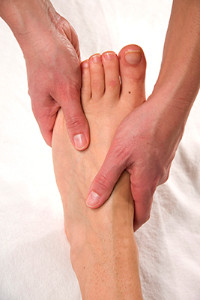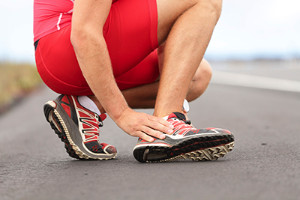
(908) 381-8160Berkeley Heights

 Peripheral neuropathy is a disorder that occurs frequently in diabetics, typically in the feet. The symptoms include: numbness, tingling, throbbing, freezing/burning sensation, and pain. Not all those with diabetes will get peripheral neuropathy, and not all suffering from it will have the exact same symptoms. This neuropathy occurs when the walls of the capillaries, or tiny blood vessels, are damaged by high sugar levels in the blood. Due to the damage they are not able to carry enough blood to the nerves, which then leads to the aforementioned symptoms. In order to avoid peripheral neuropathy there a few things that can be done. First, and perhaps most importantly, monitor your blood sugar level, and keep it in balance. Exercise and diet can help keep your weight down, as well as your blood sugar. If you are suffering from numbness in your feet, and you haven’t been diagnosed with diabetes, it is essential that you see a doctor immediately.
Peripheral neuropathy is a disorder that occurs frequently in diabetics, typically in the feet. The symptoms include: numbness, tingling, throbbing, freezing/burning sensation, and pain. Not all those with diabetes will get peripheral neuropathy, and not all suffering from it will have the exact same symptoms. This neuropathy occurs when the walls of the capillaries, or tiny blood vessels, are damaged by high sugar levels in the blood. Due to the damage they are not able to carry enough blood to the nerves, which then leads to the aforementioned symptoms. In order to avoid peripheral neuropathy there a few things that can be done. First, and perhaps most importantly, monitor your blood sugar level, and keep it in balance. Exercise and diet can help keep your weight down, as well as your blood sugar. If you are suffering from numbness in your feet, and you haven’t been diagnosed with diabetes, it is essential that you see a doctor immediately.
Diabetic foot care is important in preventing foot ailments such as ulcers. If you are suffering from diabetes or have any other concerns about your feet, contact Dr. Janet Leicht from New Jersey. Our doctor can provide the care you need to keep you pain-free and on your feet.
Diabetic Foot Care
Diabetes affects millions of people every year. The condition can damage blood vessels in many parts of the body, especially the feet. Because of this, taking care of your feet is essential if you have diabetes, and having a podiatrist help monitor your foot health is highly recommended.
The Importance of Caring for Your Feet
Patients with diabetes should have their doctor monitor their blood levels, as blood sugar levels play such a huge role in diabetic care. Monitoring these levels on a regular basis is highly advised.
It is always best to inform your healthcare professional of any concerns you may have regarding your feet, especially for diabetic patients. Early treatment and routine foot examinations are keys to maintaining proper health, especially because severe complications can arise if proper treatment is not applied.
If you have any questions please feel free to contact our office located in Berkeley Heights, NJ . We offer the newest diagnostic and treatment technologies for all your foot and ankle needs.
 According to the American Academy of Pediatrics (AAP), sports-related injuries are becoming more and more common among young athletes, especially for those who play soccer. Some common soccer injuries of the legs and feet include ankle and knee injuries such as ligament (ACL) tears, most common among girls, and heel pain, which can occur as a result of irritation of the growth plate of the heel bone. Avoiding leg and foot injuries during soccer involves wearing properly-fitted cleats that have good heel and arch support along with grip, sufficient training to help condition and strengthen endurance, using water-resistant and properly inflated soccer balls, and limiting aggressive contact between players. Being taught proper techniques can help reduce the risk of injury.
According to the American Academy of Pediatrics (AAP), sports-related injuries are becoming more and more common among young athletes, especially for those who play soccer. Some common soccer injuries of the legs and feet include ankle and knee injuries such as ligament (ACL) tears, most common among girls, and heel pain, which can occur as a result of irritation of the growth plate of the heel bone. Avoiding leg and foot injuries during soccer involves wearing properly-fitted cleats that have good heel and arch support along with grip, sufficient training to help condition and strengthen endurance, using water-resistant and properly inflated soccer balls, and limiting aggressive contact between players. Being taught proper techniques can help reduce the risk of injury.
Sports related foot and ankle injuries require proper treatment before players can go back to their regular routines. For more information, contact Dr. Janet Leicht of New Jersey. Our doctor can provide the care you need to keep you pain-free and on your feet.
Sports Related Foot and Ankle Injuries
Foot and ankle injuries are a common occurrence when it comes to athletes of any sport. While many athletes dismiss the initial aches and pains, the truth is that ignoring potential foot and ankle injuries can lead to serious problems. As athletes continue to place pressure and strain the area further, a mild injury can turn into something as serious as a rupture and may lead to a permanent disability. There are many factors that contribute to sports related foot and ankle injuries, which include failure to warm up properly, not providing support or wearing bad footwear. Common injuries and conditions athletes face, including:
Sports related injuries are commonly treated using the RICE method. This includes rest, applying ice to the injured area, compression and elevating the ankle. More serious sprains and injuries may require surgery, which could include arthroscopic and reconstructive surgery. Rehabilitation and therapy may also be required in order to get any recovering athlete to become fully functional again. Any unusual aches and pains an athlete sustains must be evaluated by a licensed, reputable medical professional.
If you have any questions please feel free to contact our office located in Berkeley Heights, NJ . We offer the newest diagnostic and treatment technologies for all your foot and ankle needs.